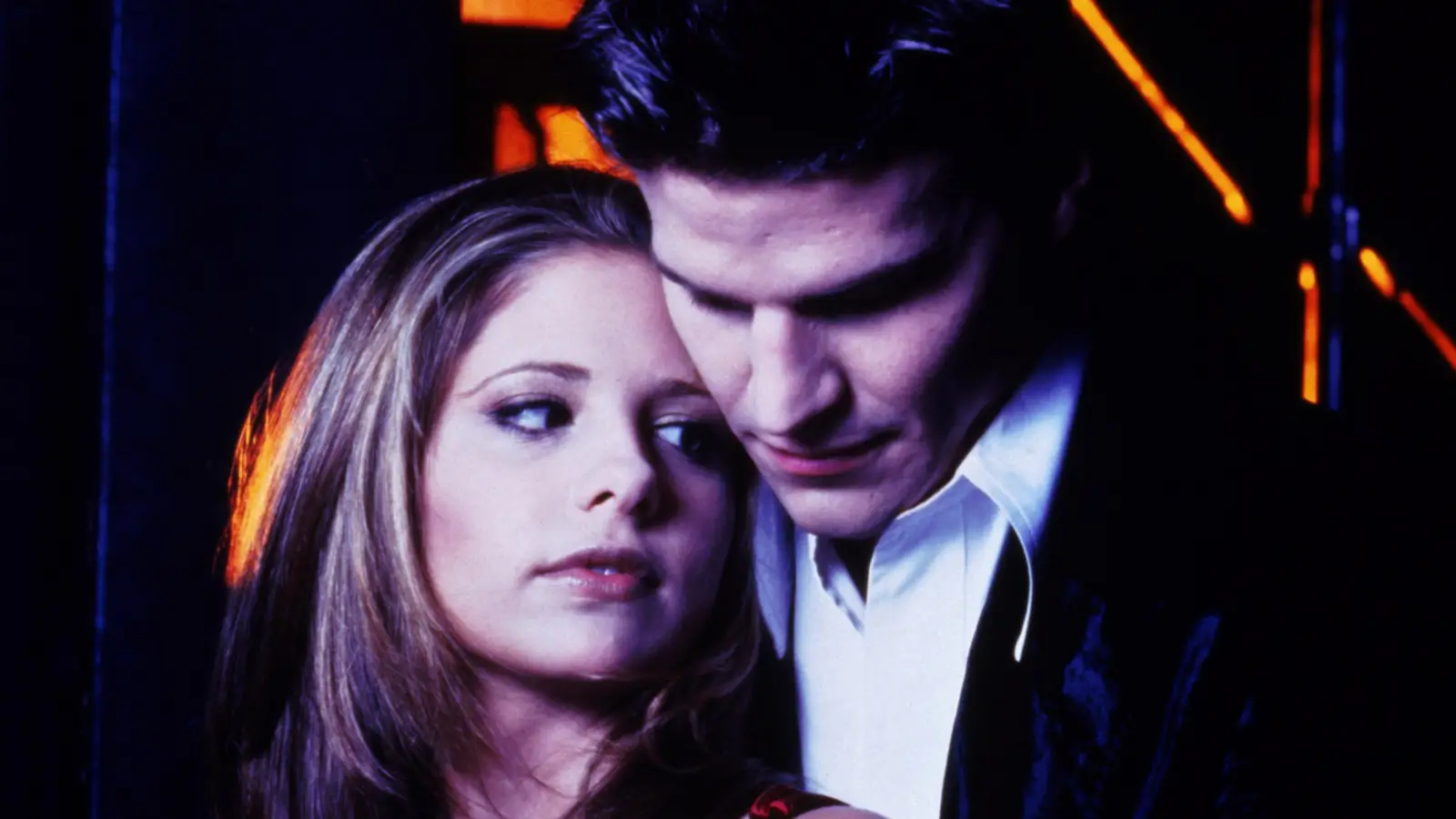
One of the best ways to understand a period of history is to look at its art, and the best fantasy TV shows of the past 60 years tell us a lot about the way the genre has evolved. Standing the test of time and capturing our imagination for a reason, these series are the highlights of their decades, and have helped sustain fantasy as one of the most exciting genres on television to this day.
While it’s unlikely that the best of the genre are fantasy TV shows that you might have missed, some of the older additions to the fictional landscape aren’t as well remembered as more recent works. However, one of the most fun parts of watching fantasy series is seeing how they’re all in conversation with each other, building to the complex and far-reaching recent shows that we love.
The 1960s – Dark Shadows (1966–1971)
As one of the best vampire TV shows of all time, it’s surprising that Dark Shadows isn’t more widely recognized as a cultural touchstone. Premiering in the mid-1960s, Dark Shadows began as a typical soap opera with some Gothic and mysterious elements. However, as the series progressed, it delved into full supernatural territory, introducing Barnabas (Jonathan Frid), the iconic vampire.
The 1960s were a big decade for fantasy, and the competition for the best of the period is fierce, with projects like Bewitched and The Addams Family also premiering in the ’60s. However, there’s something about Dark Shadows that sets it apart from typical genre fare and makes it relatively easy to watch today, even if there are dated aspects of the story.
Since it premiered so long ago, it would be impossible for Dark Shadows to be as relatable or relevant as modern works. However, it’s aged surprisingly well. Part of this is thanks to the campy parts of the supernatural soap, as well as its influence. Bringing Gothic sensibilities to the mainstream and taking advantage of the viewers’ appetite for the macabre, Dark Shadows set fantasy on a new course.
The 1970s – Wonder Woman (1976–1979)
The overlap between the fantasy and superhero genres is debatable, but the 1970s take on Wonder Woman is easily the highlight of the decade for fantasy. Unlike the ’60s, the 1970s were defined more by science fiction than fantasy, with some of the most iconic additions to the sci-fi genre coming out during this time. This made Wonder Woman a breath of fresh air and a throwback.
Lynda Carter’s turn as the titular hero, Wonder Woman, AKA Diana Prince, will always be the role that’s defined her career. While fantasy shows that centered strong female protagonists peaked in the 1990s, Wonder Woman helped pave the way for these series. Though Wonder Woman didn’t have the impact of other superhero shows and movies, it’s fondly remembered for a reason.
It’s easy to critique some of the more obvious problems with Wonder Woman, as the series fell victim to low production value and formulaic writing, but the aesthetics and design of the series have been highly influential within the Wonder Woman canon. The fact that a fantasy show focused on a female hero during this period, and Carter’s seminal performance, gives Wonder Woman a lasting legacy.
The 1980s – He-Man And The Masters Of The Universe
By the 1980s, animation was becoming a key piece of the television landscape, and the premiere of He-Man and the Masters of the Universe was a turning point for fantasy and animation. Based on the toys created by Mattel, He-Man aligned with the themes and aesthetics of 1980s fantasy, adhering to the sword and sorcery genre, and following a powerful male hero defending the universe.
Though the show only ran for two seasons, it became a cult hit in the years since it concluded, eventually becoming something of a household name for fantasy and animation connoisseurs. While the live-action movie, Masters of the Universe, from 1987 wasn’t the franchise revival that Mattel might have hoped for, it’s gone down in history as a fun, over-the-top aspect of He-Man’s lore.
When we think of He-Man and the Masters of the Universe today, it’s impossible to ignore that the original purpose of the cartoon was to sell more toys. However, the TV show was surprisingly sharp and nuanced, crafting exciting adventures that appeal to audiences of all ages, making it a nostalgic favorite for some, and a retro discovery for others.
The 1990s – Buffy The Vampire Slayer (1997–2003)
When the 1990s hit and audiences and creators saw the millennium approaching, fantasy took an interesting turn, especially coming out of the conservatism of the 1980s. This resulted in an influx of series that highlighted strong female characters and attempted to subvert some of the fantasy tropes that had defined the earlier decades. After this, Buffy the Vampire Slayer entered the scene, and everything changed.
While Xena: Warrior Princess, Charmed, and Sabrina the Teenage Witch all fulfilled similar niches as Buffy, there’s no denying that the iconic series is in a class of its own. Often discussed in conversations about the best fantasy shows of all time, not just the 1990s, Buffy has a complex lore, vivid characters, and enduring themes, cementing it as a fantasy series that brought the genre into the modern age.
From the episodes that feature Buffy the Vampire Slayer’s best villains to the overarching character development that has made Buffy so iconic, the long-term legacy of the series can’t be overstated. Influencing every vampire-centric project that came after it, and sparking interest in the pop culture and reference-heavy dialogue, full of quips and slang, Buffy the Vampire Slayer transcends genre in every respect.
2000s – Supernatural (2005–2020)
The fantasy and crime procedural genres have a lot of overlap, and as the 2000s progressed, it became increasingly clear that more series were going to explore this niche of storytelling. However, few struck as successful a balance as Supernatural, the long-running and enormously popular fantasy show that helped renew interest in the genre during a transitional time for television.
In the era of prestige TV, darker dramas that followed antiheroes, like The Sopranos or Mad Men, were all the rage, but Supernatural managed to carve a foothold in the television landscape. After the ’90s set a precedent for weaving contemporary references into the fabric of a show, the 2000s, and Supernatural in particular, leaned into the meta-textual references that came to define the horror-fantasy project.
Of course, it can’t be overlooked that the chemistry between the main characters, Sam and Dean Winchester, played by Jared Padalecki and Jensen Ackles, is part of what kept fans watching for all fifteen seasons of the series. Finding a fantastic middle-ground between the monster-of-the-week format and the overarching plot points, Supernatural’s hold on the cultural conversation hasn’t diminished in the years since it concluded.
2010s – Game Of Thrones (2011–2019)
It could easily be argued that the fantasy genre works better on television than it does in film format, especially when it comes to screen adaptations of fantasy novels. This couldn’t have been truer for the iconic high fantasy TV show, Game of Thrones, which brought the beloved books by George R.R. Martin to life, and heralded the fantasy renaissance of the 2010s and early 2020s.
Notable for its crossover popularity with fans of the speculative fiction genre and audiences who wouldn’t traditionally seek out these narratives, Game of Thrones was a major hit for HBO. However, the streaming service/network and the series helped each other, and it’s likely that Game of Thrones wouldn’t have been half as powerful without the violence, gore, and explicit content that made it both compelling and a little taboo.
The number of TV shows that have tried to be the next Game of Thrones in the years since the series premiered is innumerable, as everyone wanted a piece of its success. However, there will only ever be one Game of Thrones, as the show found a way to blend character drama, political intrigue, and a compelling magic system, all in a brilliantly acted and written package.
2020s – Arcane (2021–2024)
Not just impactful because of its place within the video game or animation genres, Arcane is one of the best TV shows of the decade, fantasy or not. Despite its short run, releasing just two seasons, Arcane never struggled to find its audience. Even for viewers who had never played League of Legends, the video game series it’s based on, Arcane quickly became every fantasy fan’s favorite new show of the 2020s.
Of course, the 2020s are far from over, and we welcome any new additions that can hold a candle to Arcane. However, for now, it easily takes the top spot in terms of story, visuals, and character, which all work together to immerse the audience in every second of the series. The fantasy elements are a key piece of Arcane, but no aspect of the show should be overlooked.



